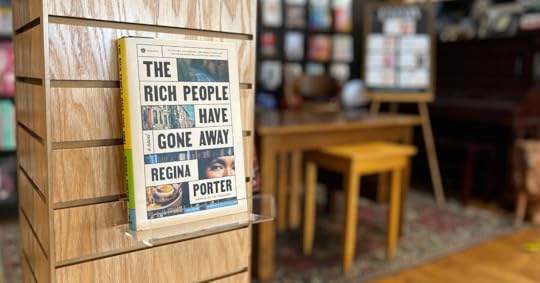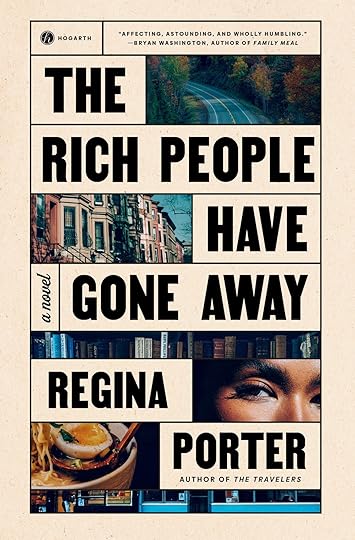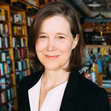The Unspoken Beats: An Interview with Regina Porter

If you’re thinking that you’re just not ready for a pandemic novel yet, you might want to think again. Regina Porter’s The Rich People Have Gone Away brings together a diverse group of New Yorkers during the height of the COVID-19 pandemic to search for a missing woman. It’s the perfect blend of rich plot and compelling characters, gripping mystery and sharp commentary. If you like stories about secrets, connection, and community, The Rich People Have Gone Away is for you. We’re thrilled that Children’s Event Manager Hannah got the chance to ask Regina some questions about her book!
HP: The Rich People Have Gone Away masterfully weaves the lives of multiple New Yorkers together to create a sweeping yet intimate map of connections and lineage. How did you organize and keep track of all those interactions, generations, and personal histories?
Regina Porter: For the most part, the chapters were introduced exactly as they unfold in the novel. This is because I follow the characters. Specifically, Theo Harper and his wife, Darla Jacobson. The novel is classically structured. There is an inciting event—Theo and Darla head upstate to Darla’s family’s country home but get in an ugly argument on a day hike. When Darla goes missing, loved ones and friends are drawn into their mess. The mess is heightened because it happens during an insane time—April 2020—the height of the pandemic. The ability to capture different perspectives and write multiple characters is rooted in my playwriting background. In plays, multiple characters are on stage at once and the audience must follow each one.
HP: This is your second novel that takes place in New York. What is it about New York that makes it such an interesting and multidimensional setting?
RP: I live here. It’s funny, you know. When I first arrived in New York as a college student and people asked where I was from, I would say, “Savannah, Georgia.” And they would say, “Oh, I love Atlanta!” Savannah was not on the map yet for most people. Midnight in the Garden of Good and Evil hadn’t been made into a film. I know my hometown, but I have lived here in New York long enough for it to be home too. My rituals of daily living are in place here and it’s fascinating to observe how the city reinvents itself, but certain issues stay constant. Class. Race. Education. Housing. Who owns. Who rents.
HP: You’re a fantastic playwright. How does this background shape your approach to crafting a novel?
RP: Playwriting is based on listening. How people talk. Their individual patterns of speech and rhythms. Dialogue. What’s said. How’s it said. The unspoken beats. I think that’s why I put white spaces in my novels sometimes. White spaces would be breaks or unspoken emotional beats in a play where a character exits. and another enters. And maybe the character who remains on stage is forced to take stock of what the character who left said. Some revelation. Some confrontation.
HP: A major theme in the book is how both race and class shaped the experiences and lasting effects of COVID. How does seeing society through the lens of a pandemic bring systemic issues to surface?
RP: When one is a writer of color, people often assume we go around thinking about race or class or themes and that is how our stories take shape. This mode of thinking can box us in as artists, even dehumanize our characters, put a sociological lens on our work. It’s as simple as this: I couldn’t think of an organic way to tackle the pandemic until Theo’s character came to me. He was deeply flawed and not someone inclined even remotely to think about race, class—or identify as black. There he was—polyamorous—and stuck at home with his pregnant wife during a pandemic. Nothing to do but get irritated and sit with uncomfortable thoughts he had been previously too busy or active to address head on. Like most of us.
HP: Out of all the characters in this story, was there a character you enjoyed writing the most?
RP: I can’t say. The character shocked me so much to say it might spoil a major surprise in the book.
HP: We always like to finish with this question: What is your favorite thing about indie bookstores?
RP: My favorite thing about independent bookstores is my favorite thing about writing: intimacy. Booksellers in independent bookstores talk about books like they have lived in the pages. You ask for a recommendation and they reach for a book in such a thoughtful way.
The Rich People Have Gone Away is on our shelves now. Grab your copy today!
Ann Patchett's Blog
- Ann Patchett's profile
- 27422 followers




